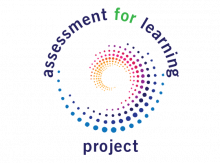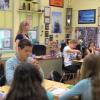The strategies that 12 states used to integrate performance assessment into state systems of assessment.

The Assessment for Learning Project (ALP) is a multi-year grant program and field-building initiative designed to fundamentally rethink the roles that assessment can and should play to advance student learning and improve K-12 education in the United States. If assessment is to become a lever for improving individual students’ opportunities and capacities to learn, then assessment must also become a lever for achieving more equitable education outcomes because it is not possible to achieve excellence without equity.
To facilitate the initiative's aims of professional capacity development, ALP will deliver a series of field-facing memos. The series will examine the various ways in which Assessment for Learning Project grantees are using, adapting and creating assessment practices oriented to learning.
Rethinking Students' Role in Assessment to Promote Greater Equity: This memo, which is the first in the series, explores some of the assessment for learning practices that the initiative is supporting at Del Lago Academy of Applied Sciences, a small public high school in Escondido, California that educates a diverse group of scholars to develop industry-specific skills and expand their social networks and access to opportunities.
Co-Design as a Lever for Increasing Student Agency: This memo, which is the second in the series, highlights the work of the New Hampshire Learning Initiative (NHLI), a member of the ALP network. The memo describes their efforts to support educators across the state to actively engage students as partners in co-designing learning goals and assessment strategies, showcasing how these efforts have enriched the experiences of teachers and students in two districts.
Developing A School Culture of Meaningful Feedback Deepens Everyone’s Learning: This memo, which is the third in the series, highlights the work of Summit View Elementary School in Tucson, Arizona and its use of ideas and practices from a blended online course, Student Agency in Assessment and Learning (SAAL) developed by researchers at WestEd, also an ALP grantee. This memo describes how one school’s participation in the blended course helped teachers actively use assessment for learning strategies, such as peer-to-peer feedback, in their teaching, and showcases how they are learning to teach for deeper understanding by using these strategies in their classrooms and by making their teaching practices visible to themselves and their colleagues.
Virginia’s Student-Led Assessment Networked Improvement Community: This memo, which is the fourth in the series, describes how 11 Virginia school divisions have come together to form Virginia's Student-Led Assessment Networked Improvement Community. This Networked Improvement Community (NIC) is focused on increasing the use of student-led assessment practices, including capstone projects, to increase students’ agency and ownership of their learning and assessment experiences. The work of this NIC is supported by local- and state-level efforts to reimagine assessment in ways that shift the balance from a heavy focus on standardized assessments to one that prioritizes student-centered learning. The NIC’s use of improvement science practices encouraged shared goal setting, progress monitoring, and iterative cycles that supported learning and refinement of the group’s ideas for improving student-centered learning. This collective effort to reimagine assessment fostered sustained improvements in the midst of leadership churn.
Creating Identity-Safe Spaces So Feedback Can Educate and Motivate Learners: This memo, which is the fifth in the series, highlights the ongoing work of the Leadership Public Schools (LPS) Network. LPS, driven by their belief that students are serious and capable learners, thinkers, and doers, worked to disrupt inequities by developing and refining student peer feedback practices. This memo describes what LPS discovered about creating the conditions in which peer-to-peer feedback motivates and educates each learner.
A Systems Approach to Creating an Ecology of Equity in a High-Poverty School District: This memo, which is the sixth in the series, highlights the ongoing work of the Sunnyside Unified School District (SUSD) to create an ecology of equity. Their efforts focus on developing a school system that fosters a belief in each person’s capacity to learn (administrators, teachers, and students alike) and increases students’ opportunities for success by helping them take responsibility for their own learning through the use of evidence. SUSD is also changing the conditions under which students learn by creating multilevel professional learning opportunities for adults in the district.
Keeping Connection and Equity at the Center of Teaching and Learning During the Time of COVID-19: An Interview with Two Rivers: This memo, which is the seventh in the series, features an interview with the Director of Curriculum and Instruction at the Two Rivers Public Charter School in Washington, DC. Originally planned as a piece analyzing the long-term work of the school, this memo was redesigned to feature an interview highlighting how the school rapidly responded to the changing education environment during the COVID-19 pandemic.
A Virtual Learning Excursion: The HĀ unSummit: This memo, which is the eighth and final one in the series of Field Facing Memos, describes a virtual learning excursion: the HĀ unSummit. When COVID-19 prevented travel to Hawaii last April, the HĀ unSummit was created. Members of the Assessment for Learning (ALP) network were invited to attend a virtual learning excursion to explore and deepen their individual and collective understanding of Hawaii’s HĀ (BREADTH) Framework. The unSummit was designed so participants could explore the intersections and interconnections of place, community, and learning practices. In this memo you will read about the design of the virtual learning excursion that unfolded over a series of successive meetings, listen in on some unSummit activities, such as the Pule Hāloa chant, and discover ways in which participants experienced this virtual learning that they said was transformative and a call to action.
The strategies that 12 states used to integrate performance assessment into state systems of assessment.

Overview of the Instructional Leadership Corps (ILC). Hear from ILC participants and partners on how the ILC project is inspiring students and making an impact through collaboration.
A new book, Global Education Reform: How Privatization and Public Investment Influence Education Outcomes, provides a powerful analysis of these different ends of an ideological spectrum – from market-based experiments to strong state investments in public education.
Sign up for our free newsletter to learn about new SCOPE publications and upcoming events.
© Stanford University, Stanford, California 94305.

